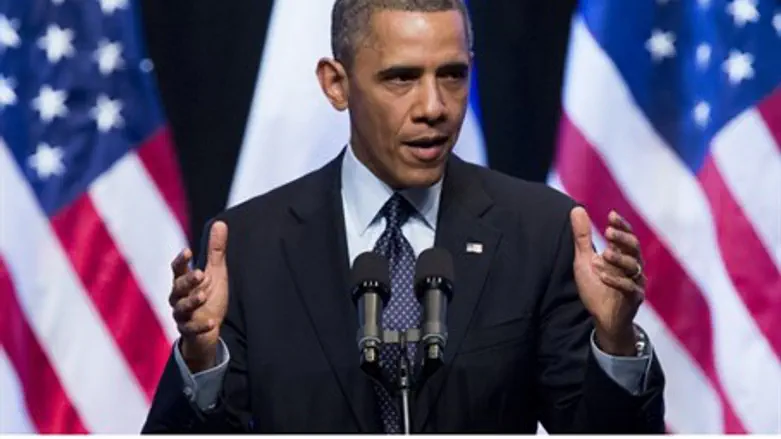
United States President Barack Obama said on Wednesday that he has not yet made a decision regarding a military strike in Syria.
Speaking to PBS NewsHour, Obama stressed he has "no interest" in "any kind of open-ended conflict" in the civil war torn country.
“I’ve not made a decision. I have gotten options from our military, had extensive discussions with my national security team,” he said.
“So let me talk about what’s at stake here. I think we all understand terrible things have been happening in Syria for quite some time, that the Assad regime there has been killing its own people by the tens of thousands, that there are sectarian arguments that have spilled over into bloodshed and have escalated over the last couple of years. And although what’s happened there is tragic, and although I have called for Assad to leave and make sure that we got a transitional government that could be inclusive in Syria, what I’ve also concluded is that direct military engagement, involvement in the civil war in Syria, would not help the situation on the ground,” said Obama. “And so we’ve been very restrained, although diplomatically, we’ve been very active; we’ve been providing a lot of humanitarian aid to people who’ve been displaced by the war.”
“But what I also said,” stressed Obama, “was that if the Assad regime used chemical weapons on his own people, that that would change some of our calculations. And the reason has to do with not only international norms but also America’s core self-interest. We’ve got a situation in which you’ve got a well-established international norm against the use of chemical weapons. Syria has one of the largest stockpiles in the world of chemical weapons.”
“This is a volatile country in a very volatile region. We’ve got allies bordering Syria. Turkey is a NATO ally, Jordan a close friend that we work with a lot. Israel is very close by. We’ve got bases throughout the region. We cannot see a breach of the non-proliferation norm that allows, potentially, chemical weapons to fall into the hands of all kinds of folks,” he added.
The president stressed that “the international norm against the use of chemical weapons needs to be kept in place. And nobody disputes – or hardly anybody disputes that chemical weapons were used on a large scale in Syria against civilian populations.”
“We have looked at all the evidence, and we do not believe the opposition possessed nuclear weapons on – or chemical weapons of that sort,” he said. “We do not believe that, given the delivery systems, using rockets, that the opposition could have carried out these attacks. We have concluded that the Syrian government in fact carried these out. And if that’s so, then there need to be international consequences.”
“So we are consulting with our allies. We’re consulting with the international community. And you know, I have no interest in any kind of open-ended conflict in Syria, but we do have to make sure that when countries break international norms on weapons like chemical weapons that could threaten us, that they are held accountable,” said Obama.
The interview with PBS was made as speculations continue on whether Obama will order a strike in Syria because of last week’s chemical attack.
The White House said, according to a Tuesday report in the Wall Street Journal, that the goal of any action would not be regime change in Syria but to respond to the alleged use of chemical weapons, which it argues presents a national security issue to the United States.
Meanwhile, the United States and Britain have come under pressure to delay military intervention in Syria, with United Nations Secretary-General Ban Ki-Moon urging both countries to hold fire.
Speaking at a press conference at The Hague, Ban called to give UN inspectors more time to examine the scene of the chemical weapons attack near Damascus last week.
He said that the inspectors needs at least four days to conduct tests, and further time to finish analyzing the results. Once that is done, the matter should be taken to the UN Security Council, he added.
